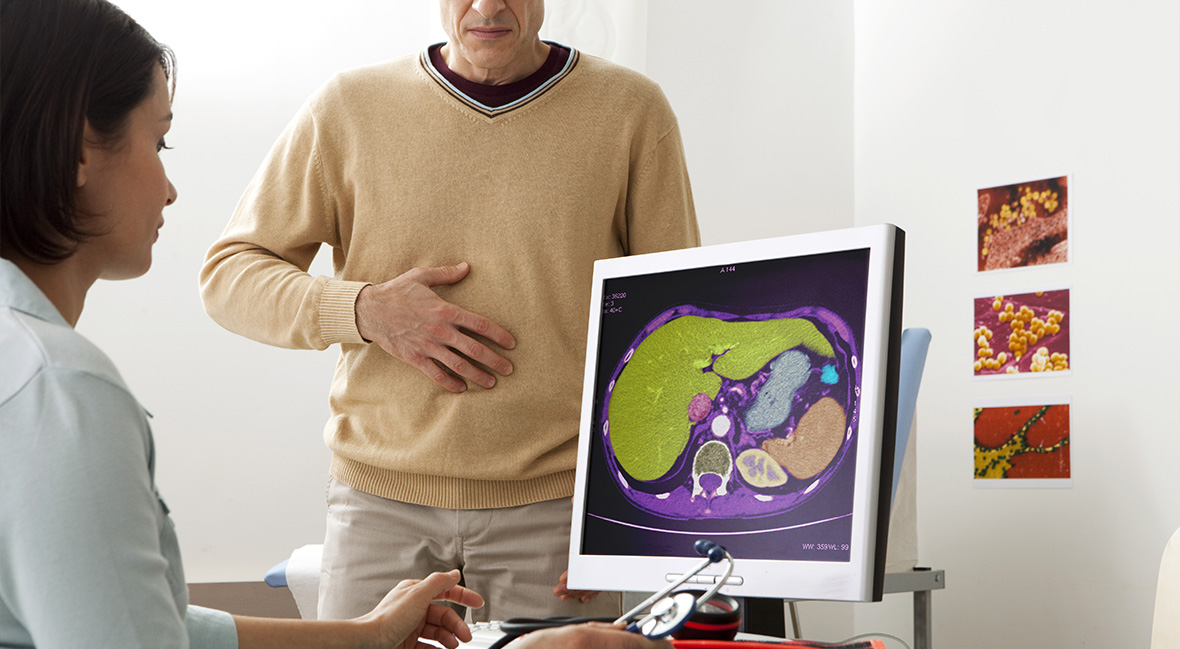The liver, pancreas, and gallbladder make up the biliary system, a portion of the digestive system known for absorbing nutrients and disposing of waste. This network can be affected by several conditions ranging from ascites to pancreatic cancer.
Ascites
Ascites is most commonly found in patients who have cirrhosis, a scarring of the liver. The condition occurs when fluid builds up in the abdomen between layers of the peritoneum, a sheet of tissue covering the stomach, bowels, liver, and kidneys. Patients are also at risk for ascites if they have other liver disease, hepatitis, or other genetic liver diseases.
Cirrhosis
Cirrhosis of the liver is a “late-stage result of liver disease and its complications,” states nonprofit medical center Cleveland Clinic. This condition occurs when scar tissue replaces healthy liver tissue, permanently damaging the liver and preventing it from working properly. Patients who abuse alcohol for many years, have hepatitis or diabetes, are obese, or have a history of liver disease are more likely at risk.
Fatty Liver Disease
Nonalcoholic fatty liver disease (NAFLD) covers a range of conditions that involve excessive fat storage in liver cells in patients who drink little to no alcohol. NAFLD can lead to nonalcoholic steatohepatitis (NASH), which is a more aggressive form of the disease. Both diseases are worsened by obesity, insulin resistance, high blood sugar, or high levels of fat in the blood.
Gallstones
Gallstones occur when hardened deposits—ranging from the size of a grain of sand to a golf ball—of digestive fluid form in the gallbladder. This condition is usually caused by bile with too much cholesterol or bilirubin, or if your gallbladder doesn’t empty correctly or enough. In rare cases, gallstones can cause severe complications including gallbladder inflammation, bile duct blockage, or pancreatic duct blockage.
Gallbladder Disease
Gallbladder disease is an umbrella term including inflammation, infection, stones, or blockage of the gallbladder. Types of gallbladder diseases include cholecystitis, gallstones, chronic acalculous gallbladder disease, or tumors.
Gallbladder Cancer
Gallbladder cancers are rare, however if they are found, they are typically adenocarcinomas. This type of gallbladder cancer begins in the cells that line the inside of the digestive system.
Gilbert’s Syndrome
A genetic liver disorder, Gilbert’s syndrome impacts the body’s ability to process bilirubin, a liquid that helps the body absorb fat, according to Cleveland Clinic. Due to a mutated UGT1A1 gene, the liver becomes deficient of the enzymes that break down the bilirubin, leading to a build up in the blood. It is a benign disorder.
Hemochromatosis
Also a hereditary disease, hemochromatosis is a condition that causes the body to absorb too much iron, which is toxic. This can lead to liver disease, heart issues, and diabetes. If a patient has inherited two mutated HFE genes from their parents, they will likely develop hereditary hemochromatosis.
Hepatitis
According to the Centers for Disease Control and Prevention, hepatitis is defined as “inflammation of the liver.” When inflamed or damaged, the liver’s purpose of processing nutrients and filtering blood is affected. This condition can be caused by alcohol use, toxins, medications, other medical conditions, or a virus. The three common types of viral hepatitis are hepatitis A, hepatitis B, and hepatitis C.
Jaundice
Jaundice, a yellowing of the skin, eyes, and mucous membranes, occurs when the body retains too much bilirubin. Infants are born with excess bilirubin, so they are usually at higher risk to develop jaundice than adults. However, adults can develop the condition due to a number of reasons including viruses such as hepatitis, alcohol abuse, autoimmune disorders, rare genetic metabolic defects, specific medications, gallstones, inflammation, gallbladder cancer, and pancreatic tumors.
Liver Cancer
There are several types of liver cancers, including hepatocellular carcinoma (most common), intrahepatic cholangiocarcinoma, and hepatoblastoma (both not as common). According to nonprofit academic medical center Mayo Clinic, it’s more likely patients will have cancer that spreads to the liver rather than begins in the liver. Patients are at greater risk for liver cancer if they develop a chronic infection with hepatitis B or C, have cirrhosis, certain liver diseases, or alcohol abuse.
Pancreatitis
Pancreatitis is the inflammation of the pancreas, an organ known for producing digestive and hormonal enzymes. There are two types of pancreatitis: acute (appears suddenly and lasts for only several days) and chronic (lasts for years). The Mayo Clinic states: “Pancreatitis occurs when digestive enzymes become activated while still in the pancreas, irritating the cells of your pancreas and causing inflammation.” If acute pancreatitis persists, it can cause long-term damage to the pancreas. There are many conditions that can lead to pancreatitis, including gallstones, alcoholism, pancreatic cancer, abdominal surgery, infection, abdomen injury, obesity, or trauma.
Pancreatic Cancer
Pancreatic cancer begins in the tissues of the pancreas. Mayo Clinic states the most common type of pancreatic cancer is called pancreatic ductal adenocarcinoma, which forms in the “cells that line the ducts that carry digestive enzymes out of the pancreas.” Risk factors for pancreatic cancer include smoking, diabetes, pancreatitis, family history of the condition, obesity, and old age.
To take preventative measures against liver, pancreas, and gallbladder conditions, schedule an appointment with Gastroenterology Associates—a team of highly trained digestive health specialists located adjacent to Long Island Center for Digestive Health (LICDH), an outpatient facility providing endoscopic and colonscopic procedures.
Topics: Conditions












